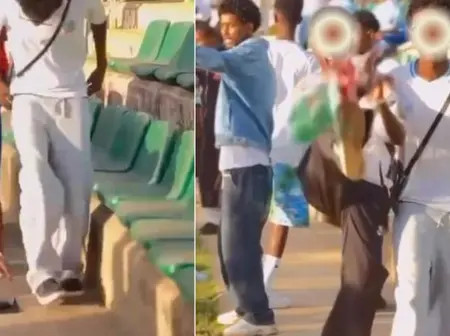Two Somali nationals, aged 14 and 17, were arraigned in a Nairobi court on Friday, September 26, after a video emerged showing them desecrating the Kenyan flag during a football match at Nyayo Stadium.
The teenagers, identified as Ibrahim Haidar Yusuf and Muhidin Ahmed Abukar, face charges of being in Kenya unlawfully, desecrating a national symbol, and creating a public disturbance. When they appeared before Senior Resident Magistrate Rose Gitau, they did not take a plea.
The court directed that they be placed under the care of the Gigiri Children’s Protection Unit while a social inquiry report is prepared. Only after this report is filed will the charges be formally addressed.
Relatives of the minors had asked the court to release them into their custody, but the magistrate declined, noting that they were not the children’s biological parents. The case will be mentioned again on Wednesday, October 1.
The arrest and arraignment have reignited debate about how Kenya’s justice system treats children in conflict with the law, particularly in situations that generate strong public emotions.
Kenyan law defines anyone under the age of 18 as a child, with specific protections guaranteed under the Constitution and the Children Act. Children under 12 years old cannot be held criminally responsible.
Those aged between 12 and 17 may face charges, but only within a juvenile justice framework designed to safeguard their welfare and rights. Both suspects in this case fall into this category, which means they cannot be treated as adults in the criminal process.
Police officers are legally empowered to arrest minors suspected of committing offences. However, the law sets strict standards for how this should be done. Officers must treat child suspects with dignity, notify parents or guardians immediately, and involve a probation officer at the earliest opportunity.
Detention is only permitted as a last resort and, where unavoidable, must take place in child-friendly facilities rather than adult police cells.
The Constitution further requires that children be brought before a court without delay, ideally within 24 hours of arrest. These safeguards reflect the principle that rehabilitation, not punishment, should guide the handling of minors in conflict with the law.
Once a case involving children proceeds to court, the justice system offers alternatives to imprisonment. The options available include counselling, probation, community service, restorative justice initiatives, or placement in a children’s institution.
Kenyan law explicitly prohibits placing minors in adult prisons. The priority is always on rehabilitating children and reintegrating them into society rather than imposing harsh penalties.
In practice, however, these protections are not always observed. Rights organisations have documented instances where children have been detained alongside adults, held longer than legally permitted, or subjected to excessive force during arrest.
Such lapses tend to be more frequent in cases that attract significant public attention and anger, as is the case with the Nyayo Stadium incident. The intense emotions surrounding the desecration of the Kenyan flag risk creating pressure for harsher treatment, even though the law requires otherwise.
The fact that the suspects are Somali nationals also adds a diplomatic dimension to the matter. Desecrating the Kenyan flag, a national symbol of sovereignty, has sparked strong reactions from the public. However, Kenya’s legal obligations remain unchanged.
The Constitution, the Children Act, and international treaties such as the United Nations (UN) Convention on the Rights of the Child oblige the state to uphold the rights of all minors, regardless of nationality.
Any deviation from these obligations could expose the authorities to legal challenges in Kenyan courts, which have a strong record of enforcing the rights of minors.
Mishandling the case could also trigger diplomatic tensions between Kenya and Somalia or exacerbate hostility between communities. For this reason, the way the case is managed will not only determine the fate of the two teenagers but also signal Kenya’s broader commitment to respecting the rule of law.
Ultimately, the Nyayo Stadium arrests highlight the tension between public outrage and constitutional principles. On the one hand, there is widespread anger over what many see as an insult to Kenya’s sovereignty and national pride. On the other hand, the justice system is bound to uphold the protections afforded to children, even in the face of public pressure.
The manner in which the courts and law enforcement handle this case will serve as a litmus test for Kenya’s juvenile justice system. Upholding the rights of the minors in accordance with the Constitution and the Children Act will demonstrate Kenya’s commitment to the rule of law. Ignoring those protections may appease calls for immediate punishment but risks undermining constitutional guarantees, damaging institutional credibility, and causing long-term harm to the children involved.
The Nyayo Stadium incident, therefore, is about much more than misconduct at a football match. It is a test of whether Kenya’s juvenile justice framework is robust enough to withstand the glare of public outrage.
The law is explicit: minors must be treated differently from adults, with rehabilitation taking precedence over punishment. Whether those principles are respected in this case will determine whether it is remembered as a moment of justice or as a failure to protect the rights of children under pressure.

Leave a Reply